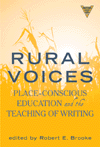Summary: Since the mid-1990s, the Nebraska Writing Project has been investigating place-conscious education and designing curricula and partnerships with place-conscious goals in mind. This seven-part audio series, created in 2020 out of their work with the National Parks Service partnership, provides an introduction to place-conscious education and delves into several curriculum and action projects teacher leaders have devised.
Resources in this Collection
Basics of Place-Conscious Education: The Nebraska Experience
In this first episode, Nebraska Writing Project director Robert Brooke introduces the basic concepts of place-conscious education and frames the series of examples that are featured in the remaining episodes.
Check it out…
We Are All Immigrants
In this second episode, Brooke is joined by educator and doctoral candidate Cara Morgenson to discuss an extensive project for her high school English learners with the Homestead National Monument and Brooke’s college juniors.
Check it out…
Blending Place-Based Education and C3WP in Rural Nebraska: A Focus on Civil Discourse
In the third episode, Brooke and English educator Melissa Legate illustrate how a place-conscious focus can blend with the C3WP emphasis on civic engagement and understanding issues from multiple perspectives.
Check it out…
Place-Conscious Experiential Writing for Students and Teachers
Learn about a partnership between the Nebraska Writing Project and Homestead National Monument that used place-based writing to give students a greater appreciation of place, writing, history, and the Homestead Act.
Check it out…
Bare Bones: Place-Based Teaching Through the Stories of Agate Fossil Beds National Monument
Part five of The Nebraska Experience gives an outline of the initial work between the Nebraska Writing Project and Agate Fossil Beds National Monument and examines the rich place-based teaching that occurred in this partnership.
Check it out…
Writing the River: Nebraska Writing Project and Niobrara Scenic River Partnership
Hear about a new partnership between the National Park Service and the Nebraska Writing Project that is under development and moving toward a planned river float for area high school students to allow them to experience the Niobrara River in a way they may not have done in the past.
Check it out…
Being Heard: Students Presenting Live to State Senators on Local Issues
The final episode of our seven-part series, The Nebraska Experience, explores an approach to teaching argument writing that involves students in researching local issues and presenting advocacy writing live to legislators at the state capitol.
Check it out…
As part of a partnership between the National Writing Project and the National Park Service, the Nebraska Writing Project presents its Place-Conscious Education NWP Radio Podcast Series. This series is designed by and features the work of leading place-conscious teachers of writing and their students and draws upon 25+ years of site-based experience of the Nebraska Writing Project.
In this first podcast, “Basics of Place-Conscious Education: The Nebraska Experience”, Dr. Robert Brooke, the Director of the Nebraska Writing Project, outlines the four main concepts of place-conscious education and connects these to a number of initiatives around the state and country.
- Active citizens as opposed to migratory education
- The 3-legged stool of education, community vitality, and environmental quality
- Spiraling out from local community to regional, national, international knowledge
- Watershed and commonwealth as the crucial web of interrelationships
The podcast reviews the history of this work in Nebraska and includes examples of two exemplar projects: the Henderson/Bradshaw school consolidation project; and the Greater Omaha schools Urban Justice Project. The podcast is framed by two place-conscious poems: Don Welch’s “Advice from a Provincial” and Grace Bauer’s “Great Plains Prayer.”
 Following this series introduction, subsequent episodes take listeners into specific place-conscious projects, interviewing teachers and learners, and illuminating different facets of place-conscious work. This series extends and updates the work described in their 2003 book Rural Voices: Place-Conscious Education and the Teaching of Writing, edited by Robert Brooke and published by NWP with Teachers College Press.
Following this series introduction, subsequent episodes take listeners into specific place-conscious projects, interviewing teachers and learners, and illuminating different facets of place-conscious work. This series extends and updates the work described in their 2003 book Rural Voices: Place-Conscious Education and the Teaching of Writing, edited by Robert Brooke and published by NWP with Teachers College Press.
 Following this series introduction, subsequent episodes take listeners into specific place-conscious projects, interviewing teachers and learners, and illuminating different facets of place-conscious work. This series extends and updates the work described in their 2003 book Rural Voices: Place-Conscious Education and the Teaching of Writing, edited by Robert Brooke and published by NWP with Teachers College Press.
Following this series introduction, subsequent episodes take listeners into specific place-conscious projects, interviewing teachers and learners, and illuminating different facets of place-conscious work. This series extends and updates the work described in their 2003 book Rural Voices: Place-Conscious Education and the Teaching of Writing, edited by Robert Brooke and published by NWP with Teachers College Press.